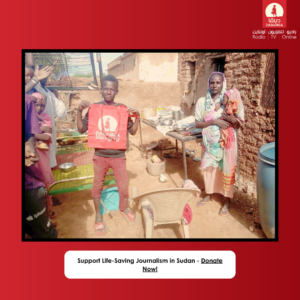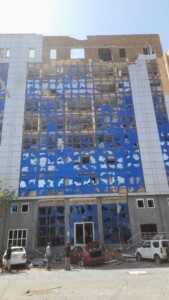Sudan court lifts indefinite ban on El Tayar newspaper
El Tayar daily newspaper has been allowed to resume publishing by Sudan’s highest court after a five month-long suspension by the security service, its editor announced.
El Tayar daily newspaper has been allowed to resume publishing by Sudan's highest court after more than four months of suspension by the security service.
The National Intelligence and Security Service (NISS) banned El Tayar from publishing on 15 December last year, for an indefinite period and for reasons still unknown. The newspaper challenged the decision in the country's Constitutional Court, which ordered that the ban on the daily be lifted last Sunday.
Editor-in-chief Osman Mirghani informed Radio Dabanga about the court ruling on Monday. “I consider the court's decision to return El Tayar a big victory in the name of justice in Sudan, and a bright spot for the Sudanese judiciary.
“We will resume publishing in the coming days as we have the court's order,” Mirghani said on the eve of World Press Freedom Day, pointing out that the editing desk is preparing to restart its activities after the long silence.
Journalist Khaled Fathi welcomed the lifting of the suspension. “The return of the daily comes against the backdrop of extremely complicated circumstances for media in Sudan,” he told Radio Dabanga.
Fathi referred to the pressure of the security service on newspapers and the censorship the press and activists face in Sudan. “Some journalists have separated from newspapers because of this.”
Strike
El Tayar has been suspended for short periods by the security apparatus before, for example in May 2015 over reports that it had published in articles about child abuse.
The NISS gave no reasons for the suspension on 15 December, but editor-in-chief Mirghani presumed at the time that his editorials sharply criticised the Finance Minister’s proposal to lift subsidies on basic commodities in 2016.
A week later, Mirghani and El Sayha editor-in-chief Ahmed Yousef El Tai were detained by NISS agents and questioned about critical articles. Both were released on personal bail.
A concerned UN Expert on Sudan's human rights situation raised El Tayar's case with Sudanese authorities
Fed-up with the publication ban, the journalists of El Tayar went on a hunger strike at their office in Khartoum on 1 March. For three days they found the support of Sudanese journalists, activists, and doctors who volunteered to conduct medical check-ups among the strikers.
El Tayar's journalists lifted their strike after the journalists' union mediated between them and the authorities, and the latter promised to start legal procedures for their case.
Last week, the UN Independent Expert on the Situation of Human Rights in the Sudan, Aristide Nononsi expressed his concern about the press freedom situation, saying he raised the case of El Tayar with the Sudanese authorities during his visit to Sudan.
He advocated for the guarantee of “an independent judicial review” of the decision to suspend the daily, “along with provision of adequate compensation”. Following the court's decision, El Tayar does not expect to receive compensation for its suspension.
Confiscations
The freedom of publication and expression are stipulated by a number of Sudanese laws and the 2005 Interim Constitution. The NISS, however, is allowed to confiscate entire print-runs of newspapers to avoid certain topics from being reported on.
Media houses are known to suffer from exhausting financial losses caused by the confiscations of print-runs, as they still have to pay their staff and the printing presses. This year print-runs of El Sayha, Akhir Lahza, and El Ayam were seized at the printing presses this year, after crossing 'red lines' drawn by the NISS: off-limit topics that media is not allowed to report on.
Recently, the security service has instructed the newspapers not to publish or cover news about the recent student demonstrations in Khartoum, or news regarding the murder of a student from El Ahlia University on the pretext that the case is pending investigation.
Last year, 52 print runs of Sudanese newspapers were confiscated from the start of 2015 up until the end of May according to the International Press Institute. The largest confiscation happened on 16 February when a record 14 newspapers were seized in one day, and on 25 May, when 10 print runs were confiscated, including pro-government papers.
'Hounding journalists'
The number of violations against journalists and press freedom increases, the Sudanese Journalists Network (SJN) reported this year. Its quarterly report marked 23 violations, including 10 by the security apparatus. Human rights charity SUDO UK received six reports of detentions of journalists and press freedom violations from January-March 2016.
“The National Intelligence and Security Service (NISS) hounds journalists and censors the print media, above all by closing down newspapers, such as the daily El Tayar in December 2015,” the Press Freedom Index of RSF read, “Or by confiscating entire newspaper issues as they come off the press.”
The 2016 World Press Freedom Index reflects the intensity of the attacks on journalistic freedom and independence by governments, ideologies and private-sector interests during the past year. Sudan ranks 174th out of 180.











 and then
and then